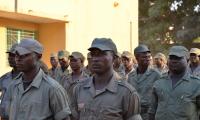West African police advocates for the promotion of a human rights-based approach

Serious cases of non-compliance by the police with basic human rights standards in the execution of its duties were brought up and denounced in connection with the 56th Ordinary Session of the African Commission on Human and Peoples´ Rights.
The cases included the use of excessive and disproportionate force, extra judicial killings and summary executions, arbitrary and illegal arrest, torture and mistreatment, and discrimination of vulnerable groups like women, migrants and foreigners among others.
Recommendations to the African Commission were formulated by an NGO forum to assist in providing states with relevant advice on how to prevent and promote respect for human rights by security forces.
For the first time, the police was represented at the NGO forum and the 56th Ordinary Session to provide the contribution by the police on how to prevent such violations and promote a police more respectful of human rights.
Police is willing to work
A side-event organised by the commission together with the Danish Institute for Human Rights and its South African partner, the African Policing Civilian Oversight Forum focused on the role of the police in the promotion of police services more respectful of rights.
The side-event was the first opportunity for the recently created West African police and human rights platform (POLI.DH) to voice the concerns of the police and its willingness to contribute to the promotion and protection of human rights and the work of the African Commission with respect to policing in Africa.
“The POLI.DH which gathers the police services from Burkina Faso, Mali and Niger, seeks to promote human rights in the action of the national police services in West Africa and to encourage the recognition of their role in protecting and promoting human rights by regional and international institutions,” said commissioner Mamane Abdelkader, permanent secretary of the platform located at the National Police School in Niamey, Niger.
“The platform’s main area of activity is the application of national ethical and legal instruments, as well as regional and international human rights instruments, within the police services. The human rights network of police services will develop skills, share experiences and good police practice, and spread and pool resources,” continued commissioner Abdelkader.
Impediments must be dealt with
The Danish Institute for Human Rights´ long term engagement with national police on the African continent indicates that effective policing is impeded by several factors including the ignorance by policemen of their own legal texts and of human rights, limited financial resources, recruitment not respecting national standards, inadequate training, poor work conditions, corruption and political interference.
“To promote human rights based law enforcement, one must act on negative factors and acknowledge the importance of recruitment, training, planning and budgeting, mechanisms to ensure oversight, accountability, integrity and transparency as well as good working relationship between the police, the state and the public,” said the institute´s strategic adviser in Africa, Monique Alexis.
Commissioner Maya Sahli Fadel, Special Rapporteur on Refugees, Asylum Seekers, Migrants and Internally Displaced Persons, underlined the opportunity of the creation of the African Police Cooperation Mechanism, AFRIPOL, by the chiefs of the police of several African countries.
“If the role of national police services for the promotion and protection of human rights seems clear, then so does the role of a continental mechanism such as AFRIPOL that unites national police services,” said Commissioner Maya Fadel.
“AFRIPOL offers a chance for the African police services to act in a concerted and more efficient manner for the protection of basic rights. As a forum for cooperation, AFRIPOL offers the states the chance to share their experiences regarding the fight against human rights violations occurring through the actions of police officers,” declared the commissioner.
The African Commission has overseen numerous policing initiatives:
